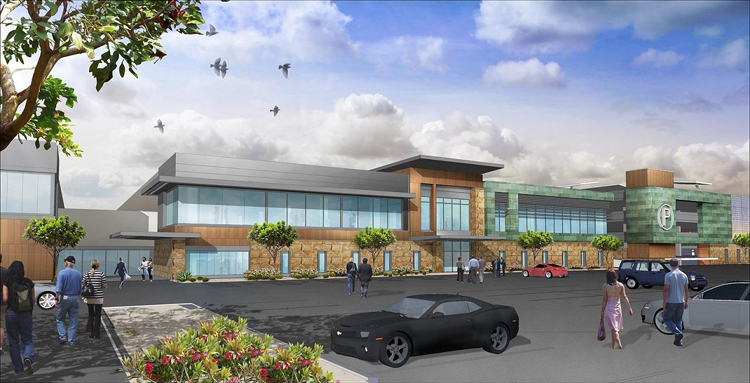In just two short days gamblers will be able to test their luck when the southern Arizona tribe, Tohono O’odham Nation, opens the first phase of the Desert Diamond Casino – West Valley at the edge of Glendale, about nine miles (14 km) northwest of Downtown Phoenix.
The casino, located approximately one mile north of the Westgate Entertainment District and University of Phoenix Stadium, marks a turning point in the tribe’s continued efforts to test gaming compact limits governing American Indian casinos in the state since the 1980’s.
The tribe has prevailed over many opponents of the casino in Arizona, most notably the Salt River Pima-Maricopa Indian Community and the Gila River Indian Community, which operate casinos in metro Phoenix and have spent more than $14 million on lobbyists to oppose the casino. Opponents claim that the casino violates promises made to Arizona voters in 2002 by the Tohono O’odham that it would not be building a casino on land it purchased outside of its reservation boundaries in the Phoenix area. No such promise was made, according to the Tohono O’odham, an assertion that has mostly been backed by the 17 court battles won by the tribe, which have found that future casinos are not expressly prohibited in the language of the compact. That gamble has, at least in part, paid off. The casino is slated to open on Sunday, December 20 to remain open 24/7 indefinitely.
The tribe is developing 135 acres of former agricultural land, and the U.S. Department of the Interior has taken 54 acres into trust as reservation land. Phase one of the development is the privately funded $200 million facility, that will be used for different purposes in the future as further developments including a larger permanent casino, convention center and hotel are developed throughout the coming years. Upon opening the casino will offer 1,089 bingo-based assortments of the industry’s most popular machines. The casino will operate under a Class II gaming license, without poker and blackjack tables. The property is in the process of obtaining a liquor license and hopes to offer that amenity as soon as February.
The exclusion of gaming tables is due to a full Class III gaming license being withheld by the Arizona Department of Gaming. Conversion of the facility into a Class III gaming operation will take place if and when the tribe succeeds in convincing the courts that they have an absolute right to self-determination. Gaming Director, Daniel Bergin has said that his opinion that the tribe committed fraud by not informing voters they might someday build a gaming facility is a valid reason to deny a license and that it is within his authority to not grant the license based on that. The state has no say in whether tribes can offer Class II gaming on their lands.
Slots director for all four of the Tohono O’odham’s casinos, Don Ayers, said that any difference in Class II and Class III machine shouldn’t be noticed. Some of the machines will be linked to Indian casinos nationwide and offer jackpots of $1 million. Slot denominations range from a penny to five dollars. Ayers also said that competing casinos were “shopped” in order to be innovative. Most of the machines feature buttons rather than the traditional arm, and are fed with pre-loaded paper tickets and plastic cards rather than coins or paper money. Chairs and isles are wider than they are in most of the state’s casinos, and ticket-redemption kiosks are strategically placed on the gambling floor. Features of the casino include an adjustable lighting system, large-screen televisions throughout the facility, food court, free self-serve drinks, and the currently alcohol-free sports bar. Smoking will be permitted, but a heavy-duty air-filtration system is intended to handle the smoke, according to a company spokesman.
Tribal leaders say construction of the site will be ongoing. They envision a larger, Class III casino, a 400-room hotel, full-service bar, 100,000 square feet of meeting and convention space, more restaurants, retail outlets and other amenities. Upon completion, more than 3,000 permanent jobs will be created, in the surrounding area and at the casino, with an economic impact exceeding $300 million annually.
The tribe was sued by Glendale officials in an attempt to stop construction, but after spending millions on legal fees was unsuccessful and dropped the suit. Since then a more conciliatory position has been taken by city officials and in August 2014 they reached an agreement with the tribe, which commits it to paying the city of Glendale $26 million over 20 years. While the casino’s potential economic impact has not been analyzed by the city, due to its location on reservation land Glendale will not receive tax revenue from the casino. Meanwhile, polling conducted last month found that the new West Valley casino had the public’s support by wide margins.



